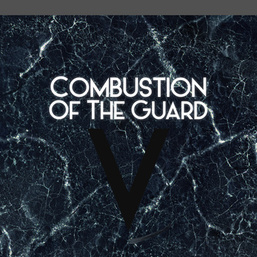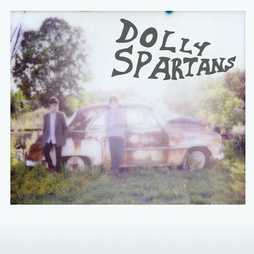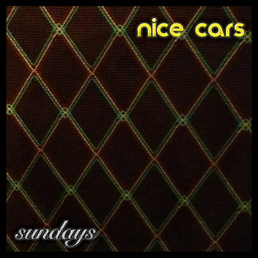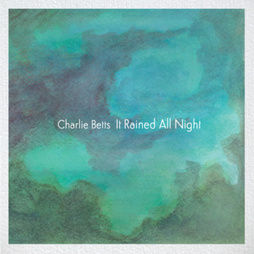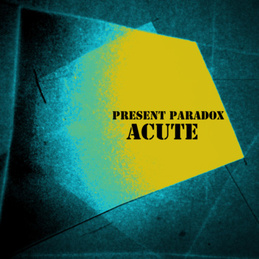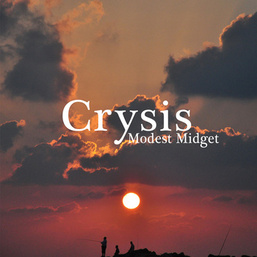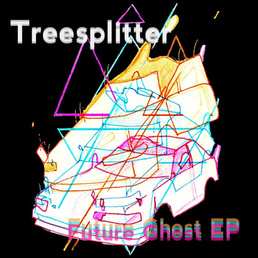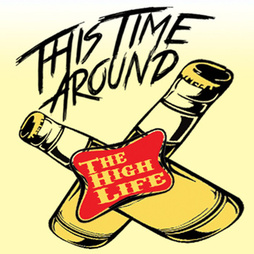|
Armed with a pseudonym and a musical ear as refined as any Vancouver rocker, artist Bill Hardman has unleashed a dynamic, tightly-crafted, DIY experience in Combustion of the Guard’s V. The simply, yet appropriately, titled five-song EP is a haunting, and nostalgic, venture through the dusty remnants of rock’s last half-century. Hardman carefully sifts through sounds for his music like an experienced art collector would for her studio. David Bowie’s vocal delivery and synth are most easily identified, but listeners can also hear shakes of Black Sabbath and Metallica sprinkled throughout most of the tracks. There’s even a Revolver-esque guitar on the closing track, “Dynamite,” and what appears to be an homage to the most famous band with the title of V’s opening song. The shared of assonance and rhyme scheme of “Shelter Smelter” with the infamous Beatles’ song will send the listener on a wild goose chase in search of contrived illusions, comparisons, and coded messages that simply do not exist. Though Combustion of the Guard does tip its cap to the Beatles at the end of the album, the only element this song shares with “Helter Skelter” is a thumping bass. Comparisons to Arcade Fire or The Black Keys are more apt. Hardman overlays his vocals to give the song a chanting, marching feel, with a subtle growl in the song’s chorus. His tightly packed lyrical message throughout the album is tied to themes of nature, innocence, and deceit. And the poetic consonance of the following line in “Shelter Smelter” is as strong an indication as any that Combustion of the Guard committed to making great art. He sings “I felt the branches crack from the skin tearing, bone breaking, pain in my back.” The overall effect of the poetry and instruments on this song, specifically, is incredibly haunting, though short-lived— the song barely covers two minutes. And here lies the greatest pitfall of what is otherwise a remarkable debut: though it has five songs, the EP is barely thirteen minutes long. Four of the five tracks hover around two minutes in length, which compromises the atmosphere, tension, and build-up that would make this strong release even more memorable. If Hardman learns to let his songs breathe a little more, he’ll surely be an artist to look out for. Until then, V makes Combustion of the Guard an artist well worth the listen.
0 Comments
I generally find that a band with an ironically funny name means one of two things; the first being the band brings a rather comical presence to their music such as is the case on the low end with a band like Pavement or on the high end a band like Ween. The second thing is that the band is simply looking for people to find their name ironically funny, become curious about their band, and then gather fans to their music. After listening to the first six-song EP Dolly Spartans, the eponymous demo EP from the New York City post punk revivalist four-piece Dolly Spartans, I am leaning towards the latter reason as to why Dolly Spartans chose their name, because they are not a funny band, at least not that I noticed, and the name seems rather out of place for a band that plays ‘60s era blues-punk which inspired so many early English rockers, which was then in the early ‘00s revamped and called garage rock, or garage punk, as The Strokes, perhaps best known as that short lived revolutions leaders, were categorized as. If Dolly Spartans were a solo EP, which in this case it technically is because front man Michael Eliran wrote all six songs and played all the instruments himself, I think I would have perhaps praised it more, due in fact to the ever bourgeoning pool of one-man/one-woman acts out there who it seems put more effort into aggrandizing themselves through their bio’s and cover art, and sound as though they spend or have spent little to no time practicing their craft. Though Eliran definitely has, and his musical talent shouldn’t go unmentioned. So wherein does the problem lie with Dolly Spartans EP? Well ironically enough the first track “Who Are You” was a question I was asking myself in reference to Dolly Spartans after the first spin of the EP. This tune is definitely power-pop in the vein of Vampire weekend. Then there’s the near perfect rendering of The Strokes on the perfect and polished rocker, “She’s Got Treasures,” a song just as good as any that came out of that garage rock revival era. Later, on “Don’t Be Sad” they return to the softer pop verses and then revert to a sort of poppy surf-punk reminiscent of bands like Harlem and even a little bit of The Kinks. The closer “Tell Me” is slow and melodic and bursting with layers of guitars and crashing cymbals, and ends with a sudden tape slowdown, the same sound ironically enough which opens The Strokes debut Is This It? Coincidence? I think not. Taken as a whole, Dolly Spartans is a classic first recording by a young band heavily influenced by the top floating pop and rock acts of the last 50 years. And don’t get me wrong; I strongly believe that influence, not just for music but also for any art, plays a key part in the relevant success of an artist. Though one must be careful with influence and use it as such, a model though not a mirror. The recent album by John Powers Been Around should come with a warning. It’s an extremely melancholy and contemplative album that can make even the most stoic of individuals shed a tear. Powers arms himself with little more than his voice and guitar throughout the duration of the album yet the results are often powerful testaments to his ability to convey emotion and meaning through his songwriting. His songs are certainly impactful not only because of the notes he plays and textural nuances of his voice but the production itself. Powers sounds like he is playing right next to you while whispering in your ear. You can hear every word he is saying almost too clearly at times. Been Around isn’t an album that most people will be able to just pop in and play. I don’t think you will want to play Been Around at your next party or during your daily workout. Its effect is most beneficial on a contemplative morning while you have time to yourself. The lyrics are important and almost as impactful as the melodies themselves. The album begins with one of the tracks entitled “Been Around” that has some additional accompaniment. Powers picks at his guitar and sings with stoic indifference as orchestral strings gently make themselves present. He poses existential questions to the listener but also provides a couple of answers. “Been Around” was one of the highlights on the album. Another highlight for me was “Follow That Call,” which combined melancholy with hopeful reassurance. A nice mixture I always enjoy when done right. As the album progresses there were a number of other songs, which I favored but for the most part Powers is consistent in regards to his songwriting ability. What I’m saying is that there are no real duds on this album. Been Around is a solid album overall but definitely has a time and place.
Nice Cars is a band comprised of Ben Zimmerman (leads: guitar/vocals) and Dave Chekan (rhythms: drums/bass). The duo was drinking beers in their basement while playing covers of the Hold Steady, the Cars, and Tom Petty. Along the way they decided to start playing their own songs which still pretty much sounds like songs from Hold Steady, The Cars and Tom Petty. This seems to be a very hard transition to make for bands and I understand why.
Their recent fourteen-song album Sundays is obviously completely DIY as production value is about on par of that with a demo bands will throw around to get live shows. I’m not going to get into the laundry list of production issues that need to be addressed but let’s just say there are a number of things to be desired. Nice Cars has their work out for them if they want to compete with formidable indie rock acts but they occasionally show pockets of potential on Sundays. At this point their best moments are the loose, drunken driven punk rock moments. The songs are mostly made up of power chords and straightforward drum beats and some songs pull it off while others fall by the wayside. Songs like “Punchtop,” “Creaks” and “Latency” are raw visceral songs, which is all about the attitude. What the band lacks in technical skills is made up with in delivery. Other songs like “Rhythms” can’t handle the sub par production, which unfortunately bypasses the potential the song had. I think the band got in a little over their head with releasing a fourteen-song album in less than a year from when they formed. The band has potential so the advice I would give here is that they continue to iron out their own style and release a smaller EP next time around with their best songs. Charlie Betts is a musician hailing from the UK who recently released a twelve-song album entitled It Rained All Night. It Rained All Night is reminiscent of soft rock/Americana music that you would hear in the ‘60s. Betts implements soft sounding synths, piano, and guitar and often has a similar palette of sounds to that of elevator music. I’m not trying to say that is a bad thing but the production is unequivocally similar to the genre on certain songs. It’s pretty much the production you would hear on a Kenny Rogers record. Betts has a pretty good singing voice. It took a bit of time getting used to it but with repeated spins I was starting to get accustomed to its gentle quality. The album starts off with “Anything That I'm Able,” which instills a feeling of traveling and moving west. The generic sounding synths were thematic and oddly hopeful. I’m pretty sure that not too much music in 2014 sounds like this. Betts switches things up on the song “The Meaning Of Freedom,” which sounds like a anti-war, protest song from the ‘60s. I thought Bett’s vocal sounded tailor made for this style of music. He worked it and it coalesced well with the acoustic instrumentation. As the album progresses, Betts flirts with a number of different styles. “Take My Advice” is pretty much straight up country that features some slick pedal steel guitar while “This Is The Way (We Mend A Broken Heart)” is a slow moving melancholy ballad. The second half of the album continues with a number of strong songs that include “Coming Home,” “Those Sad Songs” and “Back To You.” It Rained All Night can pretty much be split between soft rock/pop and country/folk music. The soft rock/pop does implement cheesy sounding synths but the songs manage to sound uniquely heartfelt. All things considered I think Betts pulls off country/folk a bit better. I have an ambivalent relationship with the record. Either way I encourage you to take a listen and make up your own mind. Technology is frequently seen as isolating, removing us from human contact, creating a future of anonymous gray boxes with glowing windows, with no one speaking or making eye contact. This is a dismissive, reductionist view, which overlooks the fact that technology can give us voice, the technical capabilities to realize our thoughts and feelings, and a platform to share them. Acute, from German producer David Kleinekottmann, who makes music under the moniker Present Paradox, is a short "mini-album", as opposed to an EP, as it is centered around one particular theme, the loss of Kleinekottmann's father. Right off the bat, this elicits comparisons to Panda Bear's finest recorded moment, Young Prayer, with its wordless, layered vocal harmonies expressing the many, often contradictory, emotions of losing a parent, or any loved one. There are sonic similarities, to back up this thesis, as Present Paradox's vocals are also dreamily reverbed and faraway, although more intelligible than Noah Lennox's. There's also more of a beat, and more structured, than Young Prayer. This plays into Acute's other main antecedents: the solo work of Thom Yorke, Eraser and Tomorrow's Modern Boxes. Like both of those records, Present Paradox is extending what is possible within the often tired singer/songwriter format. Things start off with a swooning, swelling organ tone, which can be heard repetitively throughout Acute, giving the air of a lamentation, as a very subtle, pulsing beat provides a pulse, a gridwork for the cloud. The amorphousness evaporates on "Let Me Sleep", with chiming, clockwork keys and, again, a simple but entirely effective beat. Kleinekottmann knows when to keep it simple, focusing on what works, for maximum efficacy. This makes for spacious arrangements and a dreamy cast, that still manages to hold momentum. It's back to the sacred organs on "June Freeze Frame", one of the album's highlights, drifting like a cloud at sunset, all peach and tangerine. There are no words, here, to congeal "June Freeze Frame" into a definitive meaning, and is one of the album's most effective moments, because of it. The album's other highlight, "Midnight Fog", is simply great. An almost '80s simplistic drum machine beat underscores voice and synth pads. "Midnight Fog" has a glowing, beating emerald pulse, but faraway, and glimpsed through pea-soup. This dichotomy is the nucleus of Acute; distant, yet intimate. Personal, yet cryptic. Not all of us are great at giving voice to our internal processes, and emotions are notoriously difficult to enunciate, rarely being one thing at a time. As someone who has lost their father, at a young age, I can tell you, it's not easy to articulate the void that person's departure leaves. When someone says, "What do you miss about your Dad?", I'm at a loss. Like, I don't know, the 9,306 days I've had to live, without him in my life. Not getting to share a cup of coffee and a cigarette, as an adult? And then, the relief, simultaneously, that I haven't had to defend my eccentricity to a patriarch of the former generation? It's a confusing tapestry, full of all manner of shades, hues, and nuances, and Present Paradox touches upon them all, impressively, in the span of 6 songs. Lastly, one final praise for technology, as these full arrangements would simply not have been possible, without ready access to recording technology (Kleinekottmann recorded Acute, as well as the rest of his material, at home). These songs may have come to light, but most likely with some outside contributions. It might be an approximation, a re-creation, of this introversion, this mourning, these personal ruminations, but wouldn't be the interior glimpse to a night time world of someone dealing with life, raw and unabated. In this way, electronic music, of the likes practiced by Present Paradox, Thom Yorke, and countless others, IS ABSOLUTELY revolutionizing the sole singer/songwriter, as far as what kinds of sounds and experiences are possible. We begin to spy a future where one human being could move a whole dancefloor, an entire stadium, or just the inside of someone's skull, without being pigeonholed into acoustic folk or piano pop confessionals. So here's to new forms. Here's to reaching out, and expressing one's self. Maybe you'll find some kindred spirits. Maybe you'll feel just a little bit less lonesome, in the process. I, for one, enjoyed these weightless auras immensely, from my Christmas light citadel in the burgeoning gloom, as if Kleinekottmann were plucking directly onto my ventricles. An honest and open work, delivered with excellent musicianship and great production. Check it out, in the sunset.
One of the main instigations for the first (second) wave of Punk Rock, in the '70s, was to tear down the bloated dinosaur glam prog that was popular at the time, from bands like Emerson, Lake, & Palmer, Yes... heck, even The Who, the original punks, were writing grandiose, possibly self-indulgent, symphonic works in that decade. While the proletariat optimism of punk was refreshing, and essential, tearing the impenetrable wall of the 15-foot stage down to size, it had its pitfalls, as well. So while, yes, anyone can (and should) make music, that doesn't mean everyone can play music WELL. And while punk's snotty 3 chords, played at 210 bpm, was absolutely great at expressing frustration, anger, malaise, lack of confidence, and bravado, their emotional lexicon tended to stop there. Prog, and a number of musical movements that have followed since, most notably metal, emphasize technicality and virtuosity. While, often, this can turn into clinical, cerebral exercises, an extensive musical vocabulary, and the physical chops to pull it off, allow for a more varied, more subtle, more nuanced depiction of a life. No one ever said life was simple (if they did, they were lying to you, or themselves). Life is full of ups and down, troughs and tremendous victories. Too often, albums are expected to be one thing, which makes artists pigeonhole themselves into one mood, portraying themselves as if they were one thing only; two-dimensional as a Calvin And Hobbes comic strip. This is most definitely not the case with Crysis, from Dutch progressive outfit Modest Midget. Crysis is meant as a sonic simile of life's various cycles, both internal and external. As soon as one ends, another begins. As in life, you will find many moods and many motivations, on its twelve tracks. As you might imagine, this creates a rather uneven listening experience, more of a roller coaster than a parabola; a wild, amusing, heartfelt, and thought-provoking experience. This can be seen, in micro, in the first three tracks of Crysis; "The Grand Gate Opening", is a dark, mystical synth meditation, that sounds like the grand oaken gates of a Tibetan monastery opening against a Himalayan blizzard, which gives way to the spookshow "A Centurion's Itchy Belly", full of tremulous, warbling theremins and Wicked-Witch-In-A-Hurricane guitars, that manages to be both silly and unsettling, simultaneously, which is reinforced further still by the odd, stabbing dissonance of a ragtime piano. Already you're reeling, like Sonny Liston on the ropes, and when the left hook of "Rocky Valley Of Dawn"'s upbeat ska guitar bounce comes in, you abandon all hope of trying to predict what's coming next. Much like life. A lot of sweat and blisters went into making this record, that much is obvious. 11 musicians playing 25 instruments across six different studios. This alone is a far cry from punk's plug it in and go for it approach. There is a time and a place for raw, in-the-red adrenaline (see The Stooges' classic Raw Power for examples of this, particularly Iggy's original mix), but there is certainly more to life. And how much of frustration comes about from not being able to try what you're trying to say. I won't say that I loved every second of Crysis but I don't love every second of life, either. Looking for a detailed depiction of what it feels like, waiting for the dentist? Or an erudite description of waking up from a dream, with the taste of the moon's green cheese still on your tongue), you're bound to find at least a little bit of it, here. Recommended For Fans Of: Pink Floyd, Steely Dan, The Carpenters, Genesis, Frank Zappa
Bellingham Washington three piece Treesplitter seems to have the classic “let’s start a band” scenario down. The band began by playing covers, and the only musical talent any of them had didn’t extend outside being in concert and jazz bands in high school. Though in just two years that all changed for Treesplitter and they have released their first five track EP Future Ghost. The album was recorded on a budget of two-hundred dollars. Which means it was recorded in somebody’s basement and mastered in somebody’s bedroom. So here’s a kudos to that, coming from a guy who has over his life heard enough home recordings to kill a horse, the production value on Future Ghost is actually very good provided the circumastance. Digging up some dirt on the actual writing and recording process of Future Ghost reveals a much different story. The five songs were written individually, something which is evident by the time you get to the second track, “If I should” on which single bent guitar notes squeal out with a bagpipe like freakiness, while another dirtier guitar plays Sonic Youth style feedback, and lyrics are somewhat mumbled beneath it all. All this comes in stark contrast to the early emo sounding opening track, “Burning Ships” which opens with shimmering and clean guitars and a metronome drum beat. The tune “Real” is spacey and epic, and brings in a third esthetic of keyboard. The vocals are soft spoken and spooky, and float along as if they are being held up by a breeze. Then the entire feeling of Future Ghost once again changes with “Reconcile” a dry acoustic ballad that unravels slowly and is song by two vocalists. As “Reconcile” moves along the acoustic guitar takes on a flamenco style quality and bongo-style drums are introduced into the mix. The odd closer, “Pull the Strings,” recalls early TV on the Radio, and employs noise rock elements, and uses synths, samples and a drum machine, it sounds like something you’d hear on an Atari game, before returning to a somewhat more normal song structure. If I were a doctor I would diagnose Treesplitter as well their album Future Ghost with schizophrenia. I am not trying to knock collaboration or to try and dissuade anyone’s thoughts about what a record in the general sense should be or sound like. In my estimation, something that all bands, the most experimental among them, have on an album, even if only loosely, is some sense of coherency. I know that it’s nice for everyone to get a say sometimes about how things should be done, though sometimes it works best when someone steps up as a leader and lays down a few ground rules. That seems to be what Treesplitter need to do, or else to go solo. Become A Fan Hailing from Nashville, TN Isak Wilson is a solo artist who recently released his debut EP entitled A Few Thoughts. He touts on his bandcamp page that the EP is as incongruent as it is cohesive. I think that statement is paradox within itself but I know what he is trying to say. Wilson is an artist that is exploring different ideas on this EP. Some of it works while some of it seems forced and unnatural. Wilson did write all the song as well as recorded, mixed and mastered the album. The production is passable on the acoustic tracks but buckles at the seams when he tries to add distorted guitars, hard hitting drums, etc. Not only is the softer more intimate sounding singer/songwriter material better from an aesthetic perspective but it was obvious to me that his biggest strength lies in melancholy and an acoustic guitar Wilson starts off with a solid song entitled “Smile, Dear” that sounds like a combination of Modest Mouse and Jack Johnson. It starts off sparse but builds energy as it progresses. The acoustic guitars are tranquil and pretty as Wilson delivers some of his most notable vocal melodies. The chorus is infectious when he sings “I’ll look forward to the day ahead As an opportunity instead I’ll raise the bars that I’ve set low For I’ve allowed my weaknesses to grow”. The second song “Frank” is a certified tearjerker and is hard not to compare to Bright Eyes. In fact the chorus sounds eerily similar to the song “Lua” from I’m Wide Awake, It’s Morning. Nevertheless, the song is well-written and has exceptional string parts. “Movin' On” felt like the most original sounding song out of the five. It’s a break up song that interjects some uplifting poppy moments. The addition of piano was a nice touch as well. Overall, I think this is also Wilsons best vocal performance. He sounds loose here and rolls with the emotion. Very impressive delivery. Unfortunately, the next song “If” suffers from trying too hard to meld very different sounding styles that instead of feeling seamless feel jarring. The first half is very atmospheric and was enjoyable. The awkward change comes when it all disappears and is replaced by a generic sounding Weezer-esque song. Wilsons vocals don’t sound good here. I give credit to Wilson for trying to be inventive but this song came up short. The last song “Try” is a bit confusing. I’m not sure why he didn’t just separate this track into two different songs. The first half of “Try” is acoustic based college rock reminiscent of The Violent Femme. It then fades to silence and we are introduced to the “Hidden Track” which is a silly, frivolous song that bears comparison to Weird Al. Why oh why did Wilson decide to end with this when the first three tracks were light years better is beyond my understanding. A Few Thoughts contains a lot of the typical pitfalls you hear from artists on their first album. That being said the first three songs are pretty strong. If he can find a way to blend those three songs into something that is uniquely Isaac Wilson than I predict good things to come.
This Time Around is a four-piece band comprised of Benny Garcia, Tony Vasquez, Eric Mesaros and Jorge Teran. The band released a complete DIY effort entitled The High LIfe EP. From the first song you should know what you are in for as they pull out a number of staples that come from that style of music called “pop punk”. The singer has a young nasally voice that emits teenage angst while the guitars riff sound like a mixture between New Found Glory, Green Day and Blink 182. The recording quality of the The High Life EP leaves a number of things to be desired. There wasn’t much separation in the mix between the instruments and the snare drums sounded boxy. Pretty far from the sharp, machine gun style snare you hear on a NOFX record. In all honesty the recording on The High Life sounds like a polished demo. To the bands credit this style of music is one of the hardest to capture without sounding like a ball of white noise. Musically, the band is pretty sharp from all angles. The drummers pulls off some fantastic fills while the band can create a surge of energy they combine with vocal harmonies. As far as anthemic pop punk goes these guys have the style down pat and if you are a fan of the genre I think you will embrace The High Life EP. The songs all have a similar style and approach. Loud, anthemic and fast. They kick things off with “Under the Overall” which tips their hat to the pioneers of the genres. The vocalist sings “If it's not one thing, then it's the other I can't take another set back I feel like I'm drowning, It's hours till the storm The sun doesn't shine down”. “Slapshot” contains some of that jaw dropping drumwork I was talking about while “No Hard Feelings” has some notable guitar work. Pop punk style for whatever reason seems to be a very contained genre that rarely displays much originality. This Time Around are no exception as they rely on what genre has already served us. I mention this because This Time Around not only have chemistry but there delivery is something that not every pop punk band possess. This Time Around can be a real threat is they can begin to think outside the box and up the ante in terms of recording quality. Become A Fan |
Critique/insightWe are dedicated to informing the public about the different types of independent music that is available for your listening pleasure as well as giving the artist a professional critique from a seasoned music geek. We critique a wide variety of niche genres like experimental, IDM, electronic, ambient, shoegaze and much more.
Are you one of our faithful visitors who enjoys our website? Like us on Facebook
Archives
July 2024
|

